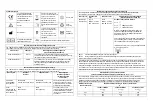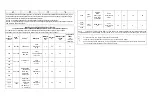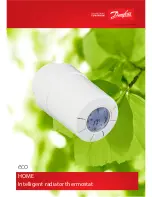
** Replace the probe cover after each use to ensure
an accurate reading and avoid cross contamination.
TH859S Ear-Type Thermometer
Intended use:
The ear thermometer is electronic thermometer using
an infrared detector (thermopile detector) to detect body
temperature from ear canal in people of all ages.
Intended operator:
Have eight years of education,
no maximum.
Thank you for purchasing the thermometer. This thermometer is
designed with an advanced infrared and ambient temperature
compensation technology for instantaneous self-diagnosis and
accurate temperature measurements. It is for home use, not meant
to replace a visit to the doctor. Please also remember to compare
the measurement result to your regular body temperature. Please
consult with doctor if you have health concerns.
Operating Instructions:
NOTE
:
If there is any temperature difference between the places
where the device is stored and where you are going to
measure, subject and the device should stay in the same
room for at least 15 minutes before measurement.
1.
Gently squeeze the opposite ends of the thermometer to pull off the probe cap. Do not use force to remove the cap.
2.
Always use a new and undamaged probe cover. Make sure the ear canal is clean.
Warning: Choking from swallowing small parts and batteries by children or pets is possible, please keep
small parts and batteries at places where children and pets can’t reach.
3. Install Probe Cover
1) Place a new probe cover on the connection ring. (
See Figure 1
)
NOTE
:
Make sure to place the “
Adhesive Side
” of probe cover “
Upward.
”
2) Align the probe with the center of probe cover. Insert the probe into the probe cover on the connection ring. (
See Figure 2
)
3) Push the connection ring until the “Click” sound. This means the probe cover has been installed successfully.
NOTE
:
If the probe cover did not install well,
will flash on the LCD screen and can’t take the ear temperature (will hear
4 beep sounds without reading shown on the LCD when measuring). Please check the setting of the probe cover
again.
Proper installation of the probe cover and using the specific probe cover ensure accurate measurements.
4. Press “ON/MEM” button to power on. The thermometer is ready for use after the ear icon stop
flashing and two short beep sounds.
5. Gently pull the ear back to straighten the ear canal and snugly position the probe into the ear
canal, aiming towards the membrane of the eardrum to obtain an accurate reading. (Fig.4-1)
6. Measuring the ear temperature
:
Use the index finger to trigger. Press the “Scan” button until
you hear a long beep. ( Fig.4-2 ). After each ear measurement, wait icon stop flashing to be ready for next measurement.
7. Power of
f
:
This device will automatically shut down after 1 minute pending
to extend battery life.
NOTE
:
a. Before the measurement, the subject should stay in a stable environment for 5mins and avoid the exercise, bath for
30mins.
b. It is recommended that you measure 3 times with the same ear. If the 3 measurements are different, select the
highest temperature.
c. To avoid the risk of cross contamination, please clean the probe according to “Cleaning and Storage” section after
each use.
d. The "Clinical Bias” is -0.2 ~ -0.4°C.
e. The "Limits of Agreement” is 0.58.
f. The "Repeatability” is 0.17°C.
Fever Indication:
If the thermometer detects a body temperature
≥
37.5°C (or 99.5°F), three short beep sound will follow one long beep sound to warn
the user for potential fever.
Switching between Fahrenheit (°F) and Celsius (°C):
In “
Power Off
” mode, press and hold the “SCAN” button, then press the “ON/MEM” button for 3 seconds, icon “
°C
” will be switched
to icon “
°F
”. You can also use the same process to change the LCD display from
°F
to
°C
.
Memory Function:
When in power on, press the “ON/MEM” button to see the temperature stored. The thermometer provides 9 sets memory for the
body temperature.
Cleaning and Storage:
The probe is the most delicate part of the thermometer. Use with care when cleaning the lens to avoid damage.
Storage temperature Range: It should be stored at room temperature between -20~+50°C, RH
≤
85%
Keep the unit dry and away from any liquids and direct sunlight.
The Probe should not submerge into any liquids.
** If device is accidentally used without probe cover, clean the probe as follows:
a. Please use alcohol swabs or cotton swabs moistened with 70%~75% alcohol to clean the probe lens.
b. Allow the probe to fully dry for at least 1 minute.
NOTE
:
Please check the device if damaged once it falls. If you can’t make sure of it, please send the complete device to the nearest
retailer for recalibration.
Holding the thermometer too long may cause a higher ambient temperature reading of the probe.
This could make the body temperature measurement lower than usual.
Changing the Battery:
This device is supplied with one lithium cell (CR2032 x 1).
○
1
Open the battery cover: Insert a pointed object into the battery cover pick hole. At the same time, use thumb to remove battery
cover. (See Figure 1)
○
2
Flip the battery out with a small screw driver (See Figure 2)
○
3
Insert the new battery under the metal
hook and press the other side of the battery down until you hear a “click”. (See Figure 3)
○
4
Replace the battery cover
The positive (+) side
Up
and the negative (-) side pointed
Down
.
Specifications:
Temperature measurement range: 34~42.2°C (93.2~108°F)
Operating temperature range: 10~40°C (50~104°F) , 15%~85% RH
Storage temperature Range: It should be stored at room temperature between -20~+50°C , RH
≤
85%
Transportation temperature shall be less than 70°C, RH
≤
95%
Atmospheric pressure: 800~1013 hPa
Comply with ASTM E1965-98, EN ISO 80601-2-56, IEC/EN60601-1-2(EMC), IEC/EN60601-1(Safety) standards, ISO10993,
RoHS.
Figure 4-1
Figure 4-2
Figure
1
Figure
2
Figure
1
Figure
2
Figure
3






















